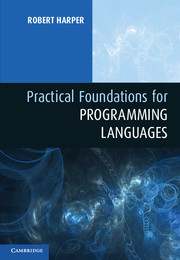Book contents
- Frontmatter
- Contents
- Preface
- Part I Judgments and Rules
- Part II Statics and Dynamics
- Part III Function Types
- Part IV Finite Data Types
- 11 Product Types
- 12 Sum Types
- 13 Pattern Matching
- 14 Generic Programming
- Part V Infinite Data Types
- Part VI Dynamic Types
- Part VII Variable Types
- Part VIII Subtyping
- Part IX Classes and Methods
- Part X Exceptions and Continuations
- Part XI Types and Propositions
- Part XII Symbols
- Part XIII State
- Part XIV Laziness
- Part XV Parallelism
- Part XVI Concurrency
- Part XVII Modularity
- Part XVIII Equational Reasoning
- Part XIX Appendix
- Bibliography
- Index
14 - Generic Programming
from Part IV - Finite Data Types
Published online by Cambridge University Press: 05 February 2013
- Frontmatter
- Contents
- Preface
- Part I Judgments and Rules
- Part II Statics and Dynamics
- Part III Function Types
- Part IV Finite Data Types
- 11 Product Types
- 12 Sum Types
- 13 Pattern Matching
- 14 Generic Programming
- Part V Infinite Data Types
- Part VI Dynamic Types
- Part VII Variable Types
- Part VIII Subtyping
- Part IX Classes and Methods
- Part X Exceptions and Continuations
- Part XI Types and Propositions
- Part XII Symbols
- Part XIII State
- Part XIV Laziness
- Part XV Parallelism
- Part XVI Concurrency
- Part XVII Modularity
- Part XVIII Equational Reasoning
- Part XIX Appendix
- Bibliography
- Index
Summary
Many programs can be seen as instances of a general pattern applied to a particular situation. Very often the pattern is determined by the types of the data involved. For example, in Chapter 9 the pattern of computing by recursion over a natural number is isolated as the defining characteristic of the type of natural numbers. This concept will itself emerge as an instance of the concept of type-generic, or just generic, programming.
Suppose that we have a function f of type ρ → ρ′ that transforms values of type ρ into values of type ρ′. For example, f might be the doubling function on natural numbers. We wish to extend f to a transformation from type [ρ/t]τ to type [ρ′/t]τ by applying f to various spots in the input where a value of type τ occurs to obtain a value of type ρ′, leaving the rest of the data structure alone. For example, τ might be bool × ρ, in which case f could be extended to a function of type bool × ρ → bool × ρ′ that sends the pairs ⟨a, b⟩ to the pair ⟨a, f(b)⟩.
This example glosses over a significant problem of ambiguity of the extension. Given a function f of type ρ → ρ′, it is not obvious in general how to extend it to a function mapping [ρ/t]τ to [ρ′/t]τ.
Information
- Type
- Chapter
- Information
- Practical Foundations for Programming Languages , pp. 102 - 106Publisher: Cambridge University PressPrint publication year: 2012
